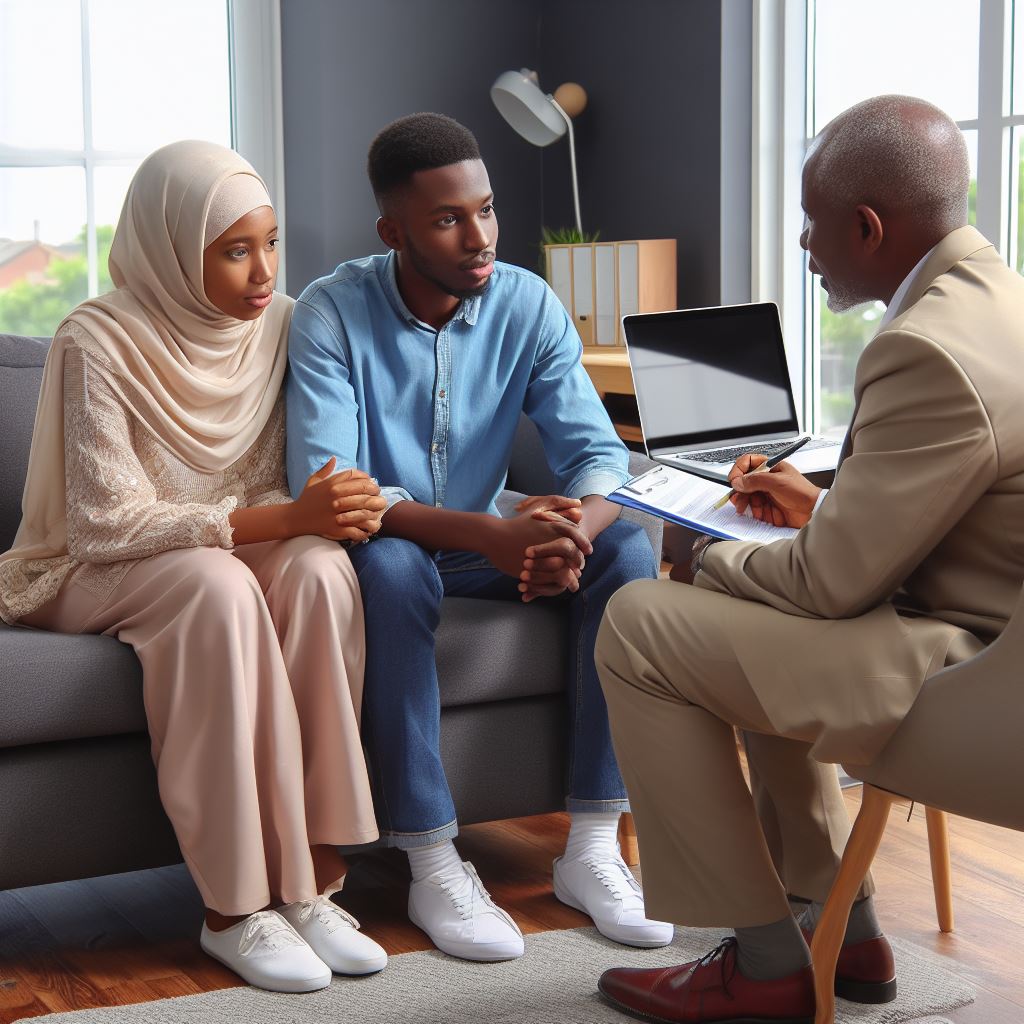Tackling the Stigma: Embracing Therapy in Nigerian Marriages
Last Updated on October 16, 2023
Introduction
Brief Explanation of the Stigma Around Therapy in Nigerian Marriages
Within the intricate fabric of Nigerian marriages, a hidden realm known as ‘Stigma Therapy in Marriages’ often remains shrouded in taboo.
Couples grappling with problems like communication issues, financial stress, or infidelity hesitate to reach out for professional help.
Why? The prevailing stigma surrounding therapy in Nigeria’s matrimonial landscape is a substantial obstacle.
It’s seen as an admission of failure, a tarnish on the façade of a perfect union.
Cultural expectations, family pressures, and a deep-rooted fear of judgment all contribute to this reluctance.
The pervasive belief is that airing private troubles outside the family is a sign of weakness. Instead, couples are expected to endure their challenges silently, bearing their burdens alone.
Importance of Addressing and Tackling this Stigma
However, it’s high time to disentangle Nigerian marriages from the grip of this unwarranted stigma.
This is not about admitting defeat; it’s about embracing the possibility of a healthier, happier partnership.
Therapy can provide invaluable tools for understanding, empathy, and growth. It offers a safe space where couples can explore their issues and learn to navigate them effectively.
By addressing and tackling this stigma, we can pave the way for stronger, more resilient marriages.
This blog post delves into the heart of this issue, exploring the roots of the stigma and the transformative power of therapy in Nigerian unions.
It’s time to rewrite the narrative, one where therapy is an essential and commendable resource for couples seeking a flourishing, enduring love.
Understanding the Stigma
Cultural and societal factors contributing to the stigma
- Nigerian culture places a strong emphasis on privacy, making therapy seem invasive.
- The belief in supernatural or spiritual causes of problems undermines the need for therapy.
- Stigma is perpetuated by societal pressure to uphold traditional gender roles and maintain a perfect facade.
- The fear of being perceived as weak or inadequate prevents many couples from seeking therapy.
- Mental health issues are often misunderstood and seen as a personal failing rather than an illness.
Common misconceptions about therapy in Nigerian society
- Therapy is seen as a last resort, only considered when a marriage is on the verge of collapse.
- Many believe that therapy is only for individuals with severe mental health problems.
- The misconception that outsiders cannot understand the complexities of Nigerian marriages hinders therapy.
- Therapy is often associated with Western ideals and deemed incompatible with Nigerian traditions.
- Reliance on religion to solve marital issues undermines the potential benefits of therapy.
Negative consequences of the stigma on couples and marriages
- The stigma leads to feelings of shame and guilt, making couples reluctant to seek help.
- Untreated issues can escalate and cause deeper emotional and psychological damage.
- Internalizing the stigma can lead to increased stress and strain on the relationship.
- The lack of support and understanding from family and friends exacerbates marital problems.
- The stigma perpetuates a cycle of unhealthy relationship patterns and prevents growth and healing.
Read: Rekindling Romance: Therapy Tips for Long-Term Couples in Nigeria
Recognizing the Benefits of Therapy
Positive impact of therapy on marriages
In recent years, there has been an increased recognition of the benefits of therapy in Nigerian marriages.
Couples are starting to understand that seeking professional help is not a sign of weakness but rather a proactive step towards a healthier relationship.
Therapy provides a safe space for couples to address their issues without judgment.
It allows them to explore their emotions and thoughts openly, leading to a better understanding of themselves and their partner.
Through therapy, couples can navigate the challenges in their marriage and work towards finding solutions.
Moreover, therapy equips couples with essential skills and tools to strengthen their relationship.
It helps them develop effective communication strategies, build trust, and enhance intimacy.
By learning how to express their needs and concerns in a healthy manner, couples can avoid misunderstandings and conflicts.
Furthermore, therapy offers couples the opportunity to gain insights into their relationship dynamics.
A therapist can help identify unhealthy patterns and behaviors that may be contributing to the problems within the marriage.
By recognizing these patterns, couples can break free from destructive cycles and establish healthier ways of relating to each other.
Overall, therapy has the power to transform marriages.
It provides couples with the support, guidance, and resources they need to build a strong and fulfilling relationship.
The role of therapy in improving communication and conflict resolution
One of the significant benefits of therapy is its ability to improve communication between couples.
In therapy sessions, couples learn effective communication skills such as active listening, assertiveness, and empathy.
Therapists help couples identify communication barriers and provide strategies to overcome them.
Through open and honest conversations, couples can express their needs, desires, and concerns in a healthier way.
This increased communication leads to a deeper understanding and connection between partners.
Moreover, therapy also focuses on conflict resolution.
Couples learn how to navigate conflicts constructively, without resorting to anger or aggression.
Therapists teach them techniques to manage conflict, negotiate compromises, and find mutually satisfying solutions.
By improving communication and conflict resolution skills, therapy enables couples to address their differences in a respectful and productive manner.
It strengthens the foundation of their marriage and allows them to grow together as a team.
How therapy helps promote emotional and mental well-being in marriages
Therapy plays a crucial role in promoting emotional and mental well-being in marriages.
It provides a safe and non-judgmental space for couples to express their emotions and work through any underlying mental health issues.
Many marital problems stem from unresolved emotional wounds or mental health concerns.
Therapy helps couples identify and address these issues, fostering healing and growth.
It allows individuals to explore their emotions, increase self-awareness, and develop coping strategies.
Moreover, therapy can also provide support for individuals dealing with stress, anxiety, or depression.
Marriage can sometimes be a source of emotional strain, and therapy offers a place to process these feelings and seek guidance on managing them.
Additionally, therapy empowers couples to prioritize self-care.
It encourages them to set boundaries, practice self-reflection, and engage in activities that promote emotional well-being.
By taking care of their individual mental health, couples can create a healthier and more fulfilling marital bond.
In conclusion, therapy has numerous benefits for marriages in Nigeria.
It improves communication, enhances conflict resolution skills, and promotes emotional and mental well-being.
By recognizing the positive impact of therapy, Nigerian couples can embrace this valuable resource and strengthen their relationships.
Read: Digital Platforms for Marriage Counseling in Nigeria: A Review
Addressing the Stigma: Destigmatizing Therapy
Addressing the stigma surrounding therapy is crucial in Nigerian marriages and communities.
By promoting conversations about therapy and mental health, we can break down the barriers preventing individuals from seeking help.
Promoting conversations about therapy and mental health in Nigerian communities
In Nigerian communities, discussing mental health and therapy is often considered taboo.
This silence only perpetuates the stigma surrounding these issues, preventing people from seeking the support they need.
Therefore, it is essential to encourage open and honest discussions.
- Organize community events: Hosting workshops and seminars that focus on mental health and therapy can create safe spaces for conversations. Invite mental health professionals to share their expertise and personal experiences, fostering understanding and empathy.
- Utilize social media platforms: Engage with online communities and influencers to spread awareness about therapy. Utilize hashtags and share personal stories to normalize the idea of seeking professional help for mental health issues.
- Collaborate with religious and traditional leaders: These figures hold significant influence in Nigerian communities. By working together, they can help address misconceptions about therapy and emphasize the importance of seeking professional help when needed.
Educating the Nigerian society on the effectiveness and value of therapy
Misinformation and lack of knowledge about therapy contribute to the stigma.
By providing accurate information, we can debunk myths and highlight the benefits of therapy in improving marriages and overall mental well-being.
- Public awareness campaigns: Launch targeted campaigns that emphasize the positive impact therapy can have on relationships and mental health. Utilize various media platforms to reach a wide audience, including television, radio, and social media.
- Share success stories: Share real-life stories of individuals and couples who have benefited from therapy. Highlight the positive changes experienced in their relationships and overall quality of life. Personal narratives can be influential in changing perceptions.
- Collaborate with healthcare organizations: Partnering with healthcare providers can provide access to resources and increase the visibility of therapy services. This collaboration can also involve conducting joint workshops and information sessions to educate the public.
Encouraging open-mindedness and acceptance of therapy as a helpful resource
Overcoming the stigma requires a shift in societal attitudes towards therapy.
By fostering open-mindedness and acceptance, individuals will feel more comfortable seeking therapy as a legitimate and valuable resource.
- Challenge stereotypes: Address common stereotypes associated with therapy, such as the belief that only “crazy” or “weak” people seek help. Emphasize that therapy is for anyone who wants to improve their mental well-being and relationships.
- Provide resources and information: Make information about therapy easily accessible, ensuring that individuals understand how it can benefit their marriages and overall mental health. This can include brochures, online materials, and helpline services.
- Normalize therapy as self-care: Encourage self-care practices that include therapy as an essential component. Emphasize that seeking help is a sign of strength and self-awareness, rather than a sign of weakness.
By addressing the stigma and promoting conversations about therapy, educating the Nigerian society, and encouraging open-mindedness, we can create a supportive environment where individuals feel empowered to seek therapy for the betterment of their marriages and overall mental well-being.
Read: Marriage Life: Tips for Harmonious Living in Nigeria
Finding Support: Accessing Therapy in Nigeria
In order to tackle the stigma surrounding therapy in Nigerian marriages, it is crucial to understand the available therapy options, the role of professionals and organizations in providing therapy services, and the importance of finding culturally sensitive therapists.
Sharing information about available therapy options in Nigeria
- Nigeria offers a range of therapy options, including individual, couples, and family therapy.
- Individual therapy focuses on addressing personal issues and improving mental well-being.
- Couples therapy provides a safe space for couples to resolve conflicts and improve communication.
- Family therapy aims to strengthen familial relationships and resolve conflicts within the family unit.
By sharing this information, individuals in Nigerian marriages can be better informed about the specific therapy options available to them.
The role of professionals and organizations in providing therapy services
- Professionals, such as psychologists and licensed therapists, play a vital role in providing therapy services in Nigeria.
- They are trained to assess, diagnose, and treat various mental health issues within the context of Nigerian marriages.
- Professional organizations, such as the Nigerian Association of Clinical Psychologists, aim to promote ethical therapy practices and provide support to professionals.
- These organizations also serve as a valuable resource for individuals seeking therapy, providing directories of qualified professionals.
Understanding the role of professionals and organizations can help Nigerian couples navigate the process of finding reliable therapy services.
The importance of finding culturally sensitive therapists
- When seeking therapy in Nigeria, it is crucial to find therapists who are culturally sensitive.
- Culturally sensitive therapists are knowledgeable about Nigerian traditions, values, and societal norms.
- They understand the unique challenges faced by Nigerian couples and can tailor therapy approaches accordingly.
- Finding a culturally sensitive therapist can help individuals feel understood and increase the effectiveness of therapy.
Highlighting the importance of cultural sensitivity encourages Nigerian couples to prioritize the search for therapists who can truly understand and address their specific needs.
Basically, accessing therapy in Nigeria requires individuals in Nigerian marriages to have access to information about available therapy options, understand the role of professionals and organizations in providing therapy services, and prioritize finding culturally sensitive therapists.
By taking these steps, the stigma surrounding therapy can be tackled, and Nigerian couples can benefit from the support and guidance that therapy provides.
Read: Bridging Cultural Gaps: Counseling for Inter-Tribal Marriages

Overcoming Barriers to Therapy
Identifying and Addressing Financial Barriers to Accessing Therapy
- Budgeting for therapy: Begin by allocating a portion of your monthly budget for therapy sessions.
- Insurance options: Explore health insurance policies that cover mental health services.
- Government programs: Research if your region offers subsidies or mental health support programs.
- Pro bono services: Some therapists offer free or reduced-fee sessions. Seek them out.
- Online therapy: It can be cost-effective and convenient, as you avoid travel expenses.
- Employee assistance programs (EAP): Check if your workplace provides EAPs for counseling services.
Recognizing and Challenging Societal and Cultural Beliefs that Discourage Therapy
- Shift your perspective: Recognize that seeking therapy is a sign of strength, not weakness.
- Discuss openly: Engage in conversations about mental health within your community.
- Educate others: Help dispel myths and misconceptions surrounding therapy.
- Seek culturally sensitive therapists: Find professionals who understand your cultural background.
- Celebrate progress: Share success stories of couples who benefited from therapy.
- Self-compassion: Be kind to yourself, and don’t let societal judgments deter you.
The Role of Family and Friends in Supporting Couples Seeking Therapy
- Open communication: Talk to your loved ones about your decision to seek therapy.
- Educate them: Explain the positive impact therapy can have on your relationship.
- Request their support: Ask for their understanding and encouragement.
- Family therapy: Consider involving family members in the process when necessary.
- Set boundaries: Ensure your journey remains private, limiting interference.
- Counseling for support network: If needed, seek therapy for family or friends to navigate the change.
In Nigeria, embracing therapy in marriages is a transformative step.
Overcoming these barriers empowers couples to build healthier, happier relationships.
Personal Stories and Testimonials
Personal stories and testimonials play a crucial role in changing societal attitudes towards therapy in Nigerian marriages.
By sharing real-life experiences of Nigerian couples who have embraced therapy, the stigma can be gradually dismantled.
Sharing Real-life Experiences of Nigerian Couples who have Embraced Therapy
John and Amina, a married couple from Lagos, openly discuss their decision to seek therapy as a means of resolving their ongoing marital conflicts.
They narrate their struggles, hesitations, and ultimate breakthroughs achieved through therapy sessions.
Naomi and Tunde, a couple residing in Abuja, share their journey of emotional healing through couples therapy.
They talk about addressing communication issues, rebuilding trust, and rediscovering the love they once had for each other.
By giving voice to these real-life stories, couples who are hesitant about therapy can relate to the challenges faced and discover that seeking professional help is not a sign of weakness but a path to strength and growth.
The Positive Outcomes and Transformations Resulting from Therapy
The positive outcomes and transformations experienced by Nigerian couples who have undergone therapy are remarkable.
Couples often report improved communication skills, enhanced emotional intimacy, and a deeper understanding and appreciation of their partner.
Therapy has provided these couples with a safe and non-judgmental space to explore difficult emotions and thoughts.
It has allowed them to work through past traumas, resolve conflicts, and develop healthier coping mechanisms.
Many couples have credited therapy for revitalizing their marriage, restoring trust, and reigniting the passion that had faded away over time.
These success stories demonstrate the power of therapy in strengthening marital bonds and the potential for lasting positive change.
Inspiring and Encouraging other Couples to Consider Therapy as a Viable Option
The personal stories and positive outcomes shared by Nigerian couples who have embraced therapy serve as a source of inspiration and encouragement for others experiencing marital difficulties.
By showcasing the transformative effects of therapy, these stories aim to break down the barriers that prevent couples from seeking professional help.
They emphasize that therapy is not a last resort, but a proactive step towards a healthier, happier, and more fulfilling relationship.
The ultimate goal is to inspire individuals and couples to prioritize their mental and emotional well-being, fostering a culture that embraces therapy as a viable option for marital growth and longevity.
Generally, sharing personal stories and testimonials within the Nigerian context can be instrumental in challenging the stigma surrounding therapy in marriages.
By highlighting the positive outcomes and transformations resulting from therapy, these narratives inspire and encourage other couples to consider therapy as a viable option.
Together, we can normalize and embrace therapy, fostering healthier and more fulfilling marriages across the nation.
Conclusion
Recap of the Importance
Tackling the stigma and embracing therapy in Nigerian marriages is paramount.
Therapy fosters open communication, empathy, and problem-solving.
It equips couples with the tools to navigate challenges and strengthen their bonds.
Encouragement for Couples
To all Nigerian couples, we urge you to seek therapy without hesitation.
Therapy isn’t a sign of weakness but a commitment to a healthier, happier marriage.
It’s a space to heal, grow, and rediscover the love that brought you together.
Call to Action for Society
Nigerian society must shed its misconceptions and biases about therapy.
Let’s celebrate those who take the bold step to improve their marriages.
We need a more accepting, supportive attitude towards therapy in Nigerian marriages.
In unity, we can break the chains of stigma and build stronger, more resilient unions.


